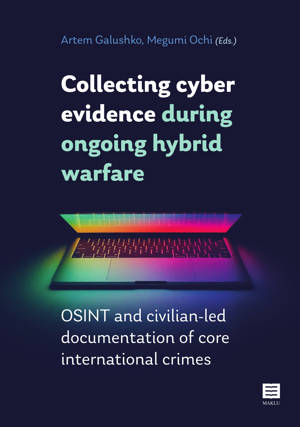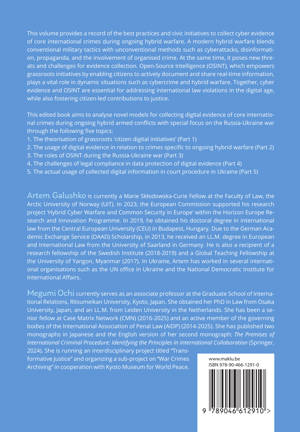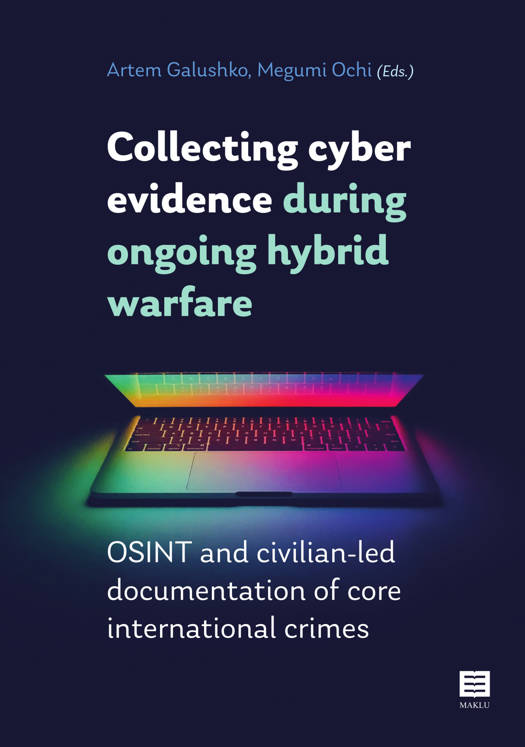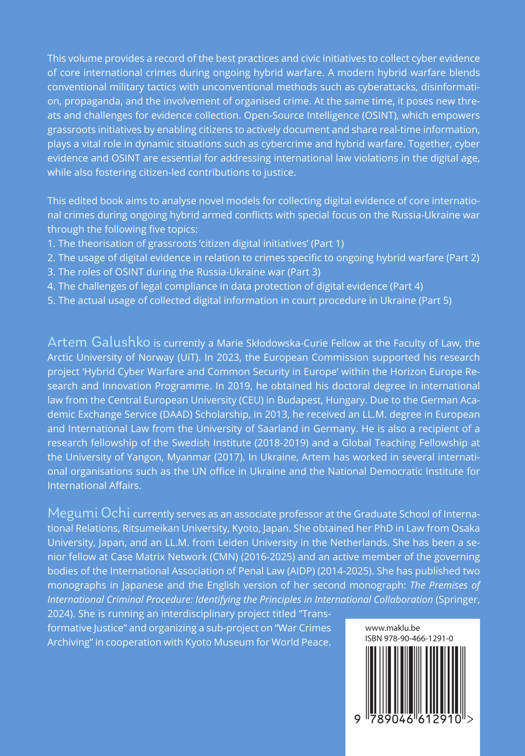
- Retrait gratuit dans votre magasin Club
- 7.000.000 titres dans notre catalogue
- Payer en toute sécurité
- Toujours un magasin près de chez vous
- Retrait gratuit dans votre magasin Club
- 7.000.0000 titres dans notre catalogue
- Payer en toute sécurité
- Toujours un magasin près de chez vous


Collecting cyber evidence during ongoing hybrid warfare
OSINT and civilian-led documentation of core international crimes
Artem Galushko, Megumi OchiDescription
This volume provides a record of the best practices and civic initiatives to collect cyber evidence of core international crimes during ongoing hybrid warfare. A modern hybrid warfare blends conventional military tactics with unconventional methods such as cyberattacks, disinformation, propaganda, and the involvement of organised crime. At the same time, it poses new threats and challenges for evidence collection. Open-Source Intelligence (OSINT), which empowers grassroots initiatives by enabling citizens to actively document and share real-time information, plays a vital role in dynamic situations such as cybercrime and hybrid warfare. Together, cyber evidence and OSINT are essential for addressing international law violations in the digital age, while also fostering citizen-led contributions to justice.
This edited book aims to analyse novel models for collecting digital evidence of core international crimes during ongoing hybrid armed conflicts with special focus on the Russia-Ukraine war through the following five topics:
1. The theorisation of grassroots ‘citizen digital initiatives’ (Part 1)
2. The usage of digital evidence in relation to crimes specific to ongoing hybrid warfare (Part 2)
3. The roles of OSINT during the Russia-Ukraine war (Part 3)
4. The challenges of legal compliance in data protection of digital evidence (Part 4)
5. The actual usage of collected digital information in court procedure in Ukraine (Part 5)
Artem Galushko is currently a Marie Skłodowska-Curie Fellow at the Faculty of Law, the Arctic University of Norway (UiT). In 2023, the European Commission supported his research project ‘Hybrid Cyber Warfare and Common Security in Europe’ within the Horizon Europe Research and Innovation Programme. In 2019, he obtained his doctoral degree in international law from the Central European University (CEU) in Budapest, Hungary. Due to the German Academic Exchange Service (DAAD) Scholarship, in 2013, he received an LL.M. degree in European and International Law from the University of Saarland in Germany. He is also a recipient of a research fellowship of the Swedish Institute (2018-2019) and a Global Teaching Fellowship at the University of Yangon, Myanmar (2017). In Ukraine, Artem has worked in several international organisations such as the UN office in Ukraine and the National Democratic Institute for International Affairs.
Megumi Ochi currently serves as an associate professor at the Graduate School of International Relations, Ritsumeikan University, Kyoto, Japan. She obtained her PhD in Law from Osaka University, Japan, and an LL.M. from Leiden University in the Netherlands. She has been a senior fellow at Case Matrix Network (CMN) (2016-2025) and an active member of the governing bodies of the International Association of Penal Law (AIDP) (2014-2025). She has published two monographs in Japanese and the English version of her second monograph: The Premises of International Criminal Procedure: Identifying the Principles in International Collaboration (Springer, 2024). She is running an interdisciplinary project titled “Transformative Justice” and organizing a sub-project on “War Crimes Archiving” in cooperation with Kyoto Museum for World Peace.
Spécifications
Parties prenantes
- Auteur(s) :
- Editeur:
Contenu
- Nombre de pages :
- 297
- Langue:
- Anglais
Caractéristiques
- EAN:
- 9789046612910
- Date de parution :
- 01-07-25
- Format:
- Livre broché
- Dimensions :
- 170 mm x 240 mm

Les avis
Nous publions uniquement les avis qui respectent les conditions requises. Consultez nos conditions pour les avis.







